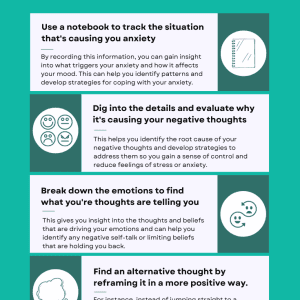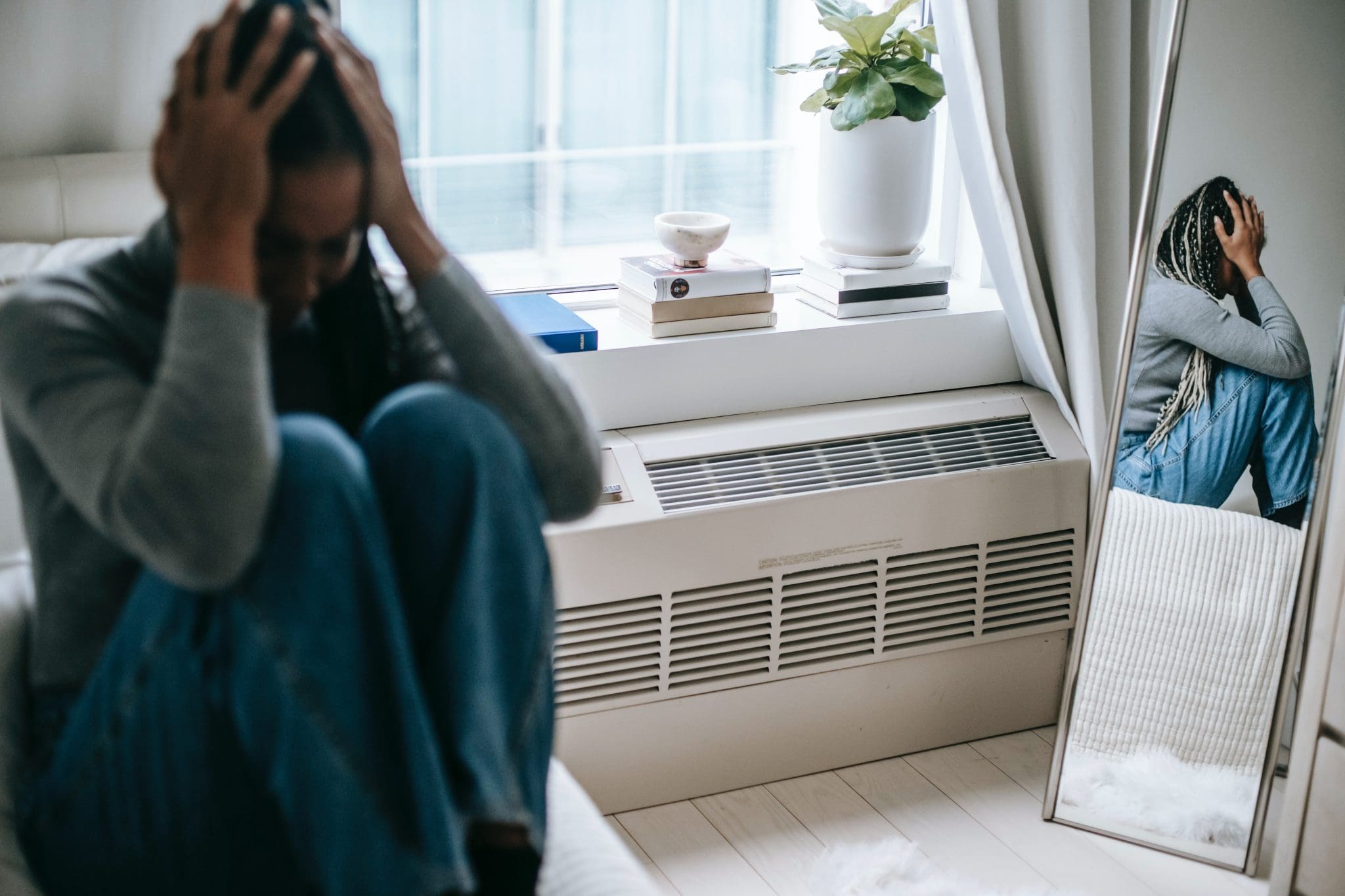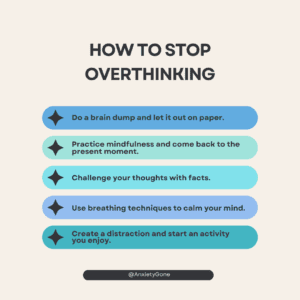Full Disclosure: Clicking on these links could mean a tiny commission for me, at no extra cost to you.
If you ever find yourself lost in a maze of thoughts, unable to escape the endless cycle of remunerating thoughts, you could be suffering from cognitive distortions (the fancy term used to describe overthinking). Whether it’s dwelling on past mistakes, worrying about the future, or simply feeling overwhelmed by the present moment, the experience of overthinking can be both exhausting and frustrating. Fortunately, there are strategies to help you stop overthinking so you can break free from the grip of rumination and regain control of your thoughts. So let’s dive in and explore the ways you can quiet your mind and find greater clarity and calm in your life.
What is Overthinking?
Ruminating is like getting stuck in a loop of thoughts about the past:
- “I shouldn’t have said those things at the meeting yesterday. Everyone must think I’m an idiot.”
- “I should have stayed at my last job. I would be happier than I am now.”
- “My parents didn’t teach me how to be confident. My insecurities have always held me back.”
On the other hand, persistent worrying is when you’re constantly imagining the worst-case scenarios for the future. You might find yourself thinking:
- “I’m going to embarrass myself tomorrow when I give that presentation. I know I’m going to forget everything I’m supposed to say.”
- “Everyone else will get promoted before me.”
- “I know we won’t ever have enough money to retire. We’ll be too sick to work and we’ll run out of money.”
Changing these thought patterns isn’t easy, but it’s totally possible with practice.
Strategies to Stop Overthinking
Here are a few strategies to help you stop overthinking the next time you feel yourself slipping into rumination mode. Give them a go and see if they help!
1. Do a Brain Dump
Journaling can be really helpful to stop overthinking, as it allows you to get your thoughts out of your head and onto paper, so they don’t feel so overwhelming. But if you’re not into journaling, don’t worry – there’s another option!
You could try making a to-do list instead. This can be especially helpful if you’re feeling anxious or stressed about all the things you have to do. By putting them down on paper, you’re creating a plan of action that can help calm your mind.
And the best part? You can do this anywhere, from a traditional notebook to your phone’s notes app. So the next time you’re feeling overwhelmed, grab a piece of paper or your phone and start jotting down your thoughts or to-dos. You’ll be surprised at how much it can help!
2. Bring Yourself Back to the Present Moment
Mindfulness is all about bringing your attention to the present moment, which can be an effective method for stopping overthinking as it typically consists of worrying about the past or future. If you’re looking for a way to practice mindfulness, body scans can be a great option! All you have to do is shift your focus away from your thoughts and onto your body. Try closing your eyes and feeling your heartbeat from the inside, or clasping your hands and squeezing them tight. Another option is to focus on the points of contact between your feet and the floor.
You can also connect with your body in other ways, like moving to music or hitting the gym. The important thing is to be present in the moment and fully engaged with your body. By doing so, you can help quiet your mind and find a sense of calm.
So the next time you’re feeling overwhelmed or anxious, try shifting your focus to your body and see how it helps you stop overthinking. It’s a simple but powerful way to practice mindfulness and find some peace amidst the chaos.
3. Spend Time in Nature
Getting some fresh air can be great for your mind, no matter where you are? But if you can get out in nature, even better! Research has found that a 90-minute walk in a natural environment can decrease your tendency to overthink.
Why does nature have this effect? Well, it could be due to the lack of noise and distractions in natural settings. And for some people, being in nature can help them appreciate something bigger than themselves and quiet their negative thoughts.
So if you’re feeling overwhelmed, take a break and step outside for some fresh air. And if you can, head to a park or trail for some quality time in nature. Your mind (and your mood!) will thank you.
4. Create a Distraction
Instead of endlessly dwelling on the intrusive thoughts seemingly taking over your brain, give yourself a break and distract yourself for a bit.
Taking a breather can give your brain the chance to work on the problem in the background, while you focus on something else like gardening or going for a walk. Sometimes, a good night’s sleep can even help your brain solve the problem while you rest! Spinning anxiety rings are an awesome tool to use to stop overthinking, giving you something to fidget with to induce calmness and relaxation.
A little distraction can give you a much-needed break and allow you to refocus your energy on something more productive. Plus, who knows? Your brain might surprise you with a solution when you least expect it!
5. Challenge Your Thoughts with Facts
It’s important to remember that not all our thoughts are facts! Sometimes our thoughts can be inaccurate, unrealistic, or just plain negative. Reframing these thoughts in a positive light can help ease the tendency to overthink.
Next time you catch yourself overthinking, try questioning those thoughts. Are they realistic? Could there be alternative scenarios? It might take some practice, but recognizing your overthinking can help you replace negative thoughts with more helpful ones. It is also an effective way to stop overthinking in its tracks.
So, let’s challenge those negative thoughts and put a positive spin on things! It’s a great step towards a happier and healthier mindset.
Tap Into Anxiety Relief Right Now
→ Mindfulness Meditation: Gain access to over 2000 guided meditations, stress relief techniques, and personalized plans to help you stay calm and focused. Get Started
→ Breathwork : Receive guided breathwork sessions designed to reduce stress and enhance your well-being. Get Started
6. Calm Your Mind with Meditation
Meditation is powerful tool can help you focus on your breath and practice redirecting your thoughts whenever they wander. Don’t worry, the goal isn’t to completely clear your mind – just to give it a positive focal point. With some practice, you’ll be able to stop overthinking in its tracks and prevent it from becoming a bigger problem.
Studies have shown that just 10 minutes of meditation can do wonders in stopping intrusive thoughts and worries. So why not give it a try? A little mindfulness can go a long way towards a happier, healthier mindset!
7. Practice Self-Acceptance
Overthinking can really get us down, especially when we’re replaying past mistakes or fretting over things we can’t control. But here’s the thing: beating ourselves up over things we regret won’t help us move forward.
So, why not try something different? Be kind and loving to yourself! Embrace self-acceptance and self-compassion. It’s not about making excuses or ignoring your mistakes, but rather, acknowledging them and moving forward with kindness and understanding.
So take a deep breath, cut yourself some slack, and let’s work on being our own biggest cheerleaders! You got this!
Here are three tips to boost your self-love and happiness:
- Give gratitude a try! Focus on the good things in your life, and take time to appreciate the aspects of yourself that you value.
- Build yourself a strong support system filled with people who uplift you and cheer you on.
- Don’t forget to forgive yourself when you make mistakes. We all have things we regret, but holding onto them won’t do any good. Instead, practice self-forgiveness and move forward with kindness and compassion.
You deserve all the love and happiness in the world, so let’s work on building a life filled with positivity and self-love!
8. Track your intrusive thoughts
Use a notebook to track the situation that’s causing you anxiety. By recording this information, you can gain insight into what triggers your anxiety and how it affects your mood. This can help you identify patterns and develop strategies for coping with your anxiety.
So, the next time you feel anxious, grab a notebook and jot down the situation that’s causing your anxiety, your mood at the time, and the first thought that comes to mind. It doesn’t have to be anything fancy, just a simple notebook will do.
Remember, taking care of your mental health is important, and tracking your thoughts and feelings can help you better understand and manage your anxiety and stop overthinking.
9. Analyze the situation to find the “why”
When you’re analyzing a situation, take the time to dig into the details and evaluate why it’s causing these negative thoughts. By examining the situation in more detail, you can identify the root cause of your negative thoughts and develop strategies to address them. This can help you gain a sense of control over the situation and reduce feelings of stress or anxiety.
So, the next time you find yourself ruminating on negative thoughts, take a step back and analyze the situation. Ask yourself why you’re feeling this way and what you can do to address the underlying issue. Gaining a deeper understanding of your thoughts and feelings can help you do just that and stop overthinking.
10. Break down your emotions to see
Try breaking down the emotions you’re experiencing and identify what you’re telling yourself about the situation. By doing this, you can gain insight into the thoughts and beliefs that are driving your emotions. This can help you identify any negative self-talk or limiting beliefs that are holding you back and develop strategies to address them.
So, the next time you’re feeling overwhelmed by emotions, take a moment to reflect on what you’re telling yourself about the situation. Ask yourself what beliefs or assumptions are driving these emotions and whether they’re helpful or not. Remember, it’s important to take care of your mental health, and gaining a deeper understanding of your thoughts and feelings can help you do just that.
11. Reframe your thoughts
Try finding an alternative to your original thought by reframing it in a more positive way. For instance, instead of jumping straight to a negative thought like “This is going to be an epic failure,” try reframing it with something like “I’m genuinely trying my best.” This simple shift in thinking can help you feel more motivated and optimistic about the situation.
Remember, our thoughts have a powerful impact on our emotions and behaviors, so it’s important to be mindful of the messages we’re sending ourselves. By finding alternative thoughts that are more positive and uplifting, we can improve our mental health and overall well-being. So, the next time you catch yourself engaging in negative self-talk, try reframing your thoughts in a more positive way. With practice, this can become a habit and help you maintain a more positive mindset in the long run.
12. Take Advantage of Therapy
If you’re stuck in the overthinking loop, it’s totally okay to ask for help! Overthinking can sometimes be a sign of a bigger mental health issue, like anxiety or depression. A professional therapist can show you some cool new tricks and coping techniques to stop obsessing over things that aren’t helping you. They can also help you figure out what works best for you, like getting your zen on with mindfulness or sweating out the stress with some physical exercise.
13. Maintain a Healthy Diet
Maintaining a healthy diet is an important step towards relieving the tendency to overthink. Studies have shown that a healthy diet is not only helpful in maintaining good physical health by preventing diseases such as cardiovascular and other metabolic diseases. It is also helpful in promoting a better mood, reducing stress, and improving an overall better cognitive function through mediating hormonal, inflammatory, and neural pathways. In fact, many studies suggest avoiding artificial sweeteners, maintaining a gluten-free diet, and using natural supplements to get more with omega 3 fatty acids, turmeric, and vitamin D to avoid inflammatory processes linked to anxiety and thus provide an overall improvement in mental health.
14. Exercise Regularly To Minimize Overthinking
Studies have shown that exercising regularly helps improve both physical and mental health. Similar to maintaining a healthy diet, exercising regularly can also help avoid the risk of chronic, non-communicable diseases. There is also evidence that regular physical activity improves overall mental health through improvements such as better sleep, improved mood, relief of stress, and overall cognitive functioning.
Experts suggest that exercise provides a better blood flow through the brain, which improves the overall functioning of its other components that influence stress, motivation, memory and mood, such as the hypothalamic-pituitary-adrenal (HPA) axis, the limbic system, the amygdala, and the hippocampus.
If exercise isn’t something you love to do, start with a brisk walk around the block or some online yoga classes.
Psst: Get 50% off your online yoga membership here.
So don’t be shy – reach out and get the support you deserve! Let’s kick those overthinking tendencies to the curb and live our best lives.
Download Our Overthinking Workbook Here
Final Thoughts (Pardon the Pun)
If you found these tips helpful and want to learn more techniques to support your mental health, check out the rest of our site. Anxiety Gone offers a range of helpful tools and resources to help you manage difficult emotions, overcome negative thinking patterns, and cultivate a more positive mindset. Whether you’re struggling with anxiety, stress, or low mood, Anxiety Gone has something for everyone. From guided meditations and mindfulness exercises to practical tips for improving your mental health, calming items and relaxation tools and so much more, our resources are designed to help you feel your best.
We’re here to support you every step of the way!
Infographics for Overthinking

















































